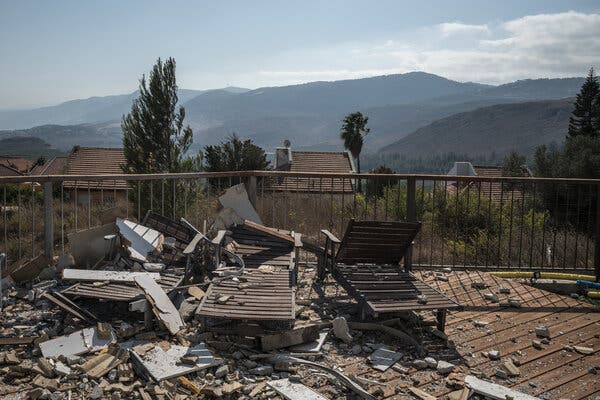After years of decline, Lebanon is ill-equipped to deal with a wave of displaced people. One family left their farm and found themselves homeless in Beirut.

Ahmed Issa and his family spent 20 hours on the road from southern Lebanon, most of it stuck sweating in bumper-to-bumper traffic, before reaching a shelter in Beirut on Tuesday afternoon. Already, he was looking for another place to go.
The shelter itself wasn’t so bad — he was grateful for the warm welcome from the volunteers running it and the water they handed out — but with every plane that flew overhead, to or from the nearby airport, the children panicked. Was it another missile?
“Even the sounds of regular planes freak out the kids,” said Mr. Issa, 33, holding his 3-year-old with one arm and pointing to a passenger jet overhead with the other. “That’s the reason we’re trying to get to another place.”
They had been sitting together on Monday afternoon at their farmhouse in Majidieh, a small village in green, fertile south Lebanon, when an Israeli missile struck close enough to see and hear, he said. They quickly dressed to leave, piled into the taxicab that Mr. Issa drives to make ends meet and joined the masses of cars heading toward Beirut, a journey that would normally take about two hours.
They were just a few of what Lebanon’s foreign minister has said are the half-million Lebanese displaced by Israeli airstrikes. About 400 people had come to this school-turned-shelter in the Bir Hassan neighborhood after it opened on Monday afternoon, and more were still coming through the gate, only to be turned away.
The government has designated 42 buildings as shelters, while other, private shelters have sprung up ad hoc. But after years of political and economic crisis, the country is badly equipped for this latest one and the many thousands of people fleeing to Beirut. Because the government did not provide supplies or staff, it fell to local aid groups, individual donors and volunteers affiliated with political parties to run the shelters and stock them with mattresses, bedding, food, water and medicine.



